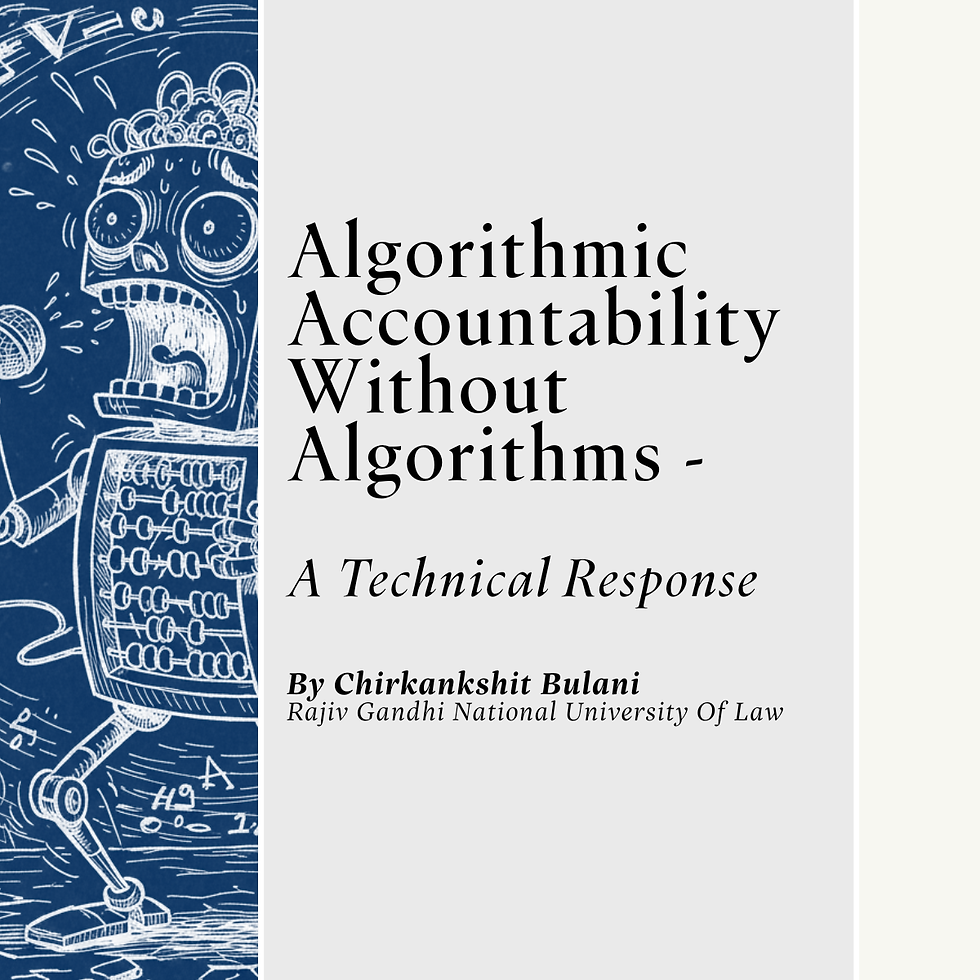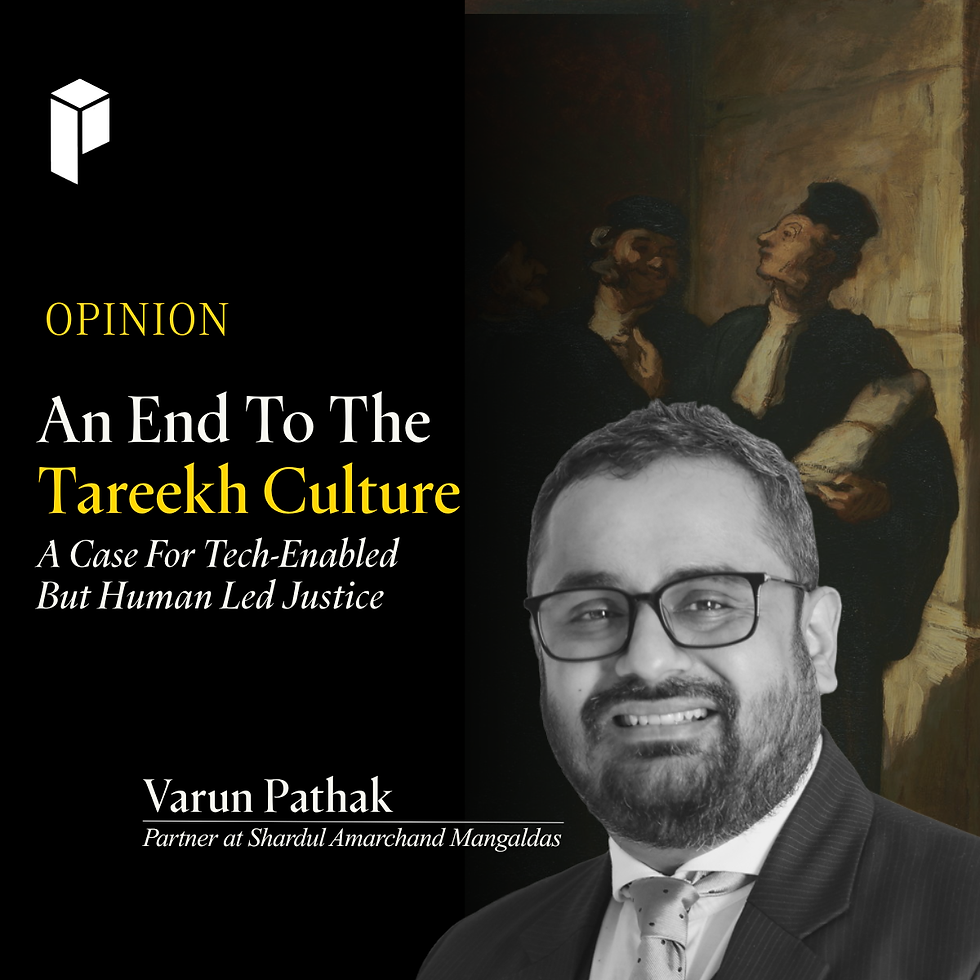Internet of Things- Is AI Taking Over Law?
- The Legal Journal On Technology
- Oct 5, 2020
- 6 min read
Updated: May 27, 2025

By Stuti Bhakat, 4th year at Bharati Vidyapeeth New Law College, Pune
1. INTRODUCTION
The work estimates about the impacts of AI that don't presently exist and which may, or may not, have ever happened. In spite of the fact that those futurist discussions have their place, it is imperative to recognize that they include critical angle, unsupported suspicions about where the innovation is going. That theoretical conversation regularly diverts from the significant legal and strategic issues that are raised by Artificial Intelligence innovation presently.
1.1 WHAT IS AI?
When people play chess, they utilize a scope of intellectual capacities, including thinking, planning, arranging, furthermore, choice making. Correspondingly, when individuals interpret from one language to another, they actuate higher-request cerebrum habitats for preparing images, setting, language, and meaning. When individuals drive vehicles, they draw in an assortment of cerebrum frameworks, counting those related with vision, spatial acknowledgment, situational mindfulness, development, and judgment. Inculcating all these qualities in a machine is AI. Basically it allows a machine to think and act on its own.
2. WHAT IS THE LEGAL PERSONALITY OF AI?
Given the significance of goal in India's criminal law statute, it is fundamental to set up the legitimate character of AI (which implies AI will have a heap of rights and commitments), and whether such an expectation can be credited to it. To address the inquiry on risk, since AI is viewed as lifeless, an exacting obligation plot that holds the maker or producer of the item subject for hurt, paying little mind to the deficiency, may be a way to deal with consider. Since security is a central right, certain principles to control the use of information controlled by an AI substance ought to be encircled as a component of the Personal Data Protection Bill, 2018.
Car crashes lead to around 400 passing’s per day in India, 90% of which are brought about by preventable human mistakes. Self-ruling vehicles that depend on AI can decrease this essentially, through keen admonitions and preventive and guarded methods. Patients now and then kick the bucket due to non-accessibility of particular specialists. Artificial intelligence can decrease the separation among patients and specialists. Be that as it may, as futurist GrayScott says, "The genuine inquiry is, when will we draft a computerized reasoning bill of rights? What will that comprise of? Furthermore, who will get the chance to conclude that?"
3. AI IN LAW
One helpful perspective of utilization of AI inside law presently is theoretically partitioning it into three classes of AI clients: the managers of law, the professionals of law, and those who are administered by law.
3.1 PRACTICE
A few exercises concerning where the utilization of AI in the act of law may be going and where it might be more restricted can be gathered from the case of case disclosure and innovation helped survey. Suit disclosure is the way toward acquiring proof for a lawsuit. In current business of prosecution, this adds up to acquiring and evaluating huge troves of archives turned over by the restricting counsel. Document audit was customarily an errand performed by lawyers who might immediately peruse each report and show regardless of whether a record was likely significant or not to the legitimate issues nearby or maybe secured by benefit. This computerized audit programming got essential with the ascent of e-disclosure, as the record troves identified with specific claims started to ascend into the several thousands and here and there a huge number of archives—well past human, manual abilities. In total, legal advisors today do a blend of undertakings that run from the profoundly dynamic to the daily practice.
The present AI is significantly more prone to have the option to computerize a legitimate errand just if there is a few fundamental structure or example that it can bridle. Paradoxically, lawyerly assignments that include dynamic reasoning, critical thinking, support, customer guiding, human knowledge, strategy investigation, and huge picture procedure are probably not going to be dependent upon computerization given the constraints of the present AI innovation.
3.2 ADMINISTRATION
The administrative includes government authorities utilizing frameworks that utilize AI innovation to make meaningful lawful or strategy decisions. A genuine case of this originates from the utilization of AI frameworks by decided in making condemning or bail choices for criminal defendants. Today, judges are progressively utilizing programming frameworks that utilize AI to give a score that endeavours to measure a litigant's danger of reoffending. Regularly, government organizationshave customized frameworks that contain a progression of rules about when candidates for advantages ought to be endorsed for benefits and when they ought not to. Typically, this is utilized as a proficiency measure to permit government workers to all the more rapidly measure candidates. Nonetheless, underline that these frameworks frequently contain computerized PC appraisals that either totally endorse the result of the choice or, in any event, impact it. significant utilization of AI in law implementation comes in facial-acknowledgment technology.
Police offices have routinely started to examine groups or endeavour to recognize suspects by coordinating photograph or video information with information bases that contain photographs of the individuals who have recently come into contact with the legislature or law authorization
3.3 USERS OF LAW
By users, we allude to the normal individuals, associations, and organizations that are represented by the law and utilize the apparatuses of the lawto direct their own and business exercises. Initially, numerous organizations use business-rationale strategy frameworks to assist them with conforming to the law. These are basically private master frameworks that contain general, PC based guidelines about organization exercises that are probably going to consent, or not agree, with different overseeing regulations. For example, an organization may need to manage complex import/trade guidelines. To guarantee consistence, they may display pertinent laws utilizing rationale and information portrayal procedures to support their inside cycles cease from exercises that would abuse the important laws. These are basic master frameworks—frequently in the type of chatbots—that give conventional clients answers to essential legitimate questions. A genuine case of this originates from the "Don't Pay" application, which gives a fundamental legitimate master framework that permits clients to explore the legitimate framework.
4. WILL TECHNOLOGY REPLACE REAL LAWYERS
These innovative changes are probably not going to make fragile living creature and blood legal counsellors repetitive at any point in the near future. While AI and other computerized programs are an incredible asset, there is a cut-off to what predictable and coherent projects can accomplish. Thus relationship building abilities are getting more profoundly esteemed than any other time in recent memory since innovation can possibly truly dominate if the customers are robots as well. This is a significant certainty to hold up under as a top priority as a future legal counsellor.
Scouts will unquestionably be expecting law possibility to be capable in consistently innovation, for example, Microsoft Word, however they will likewise be searching for receptive individuals who are happy to test and find out about new innovation. Nonetheless, legal counsellors will in any case be expected to interface with customers and utilize their insight, relational abilities and experience to structure an imaginative answer for a lawful issue.
The legitimate business is as yet creating in India and anticipating more IA based and computerized helping devices and programming. Nonetheless, these IA-based and robotized helping instruments and programming won't supplant the lawyer’s work where examination, dynamic and delineation is required yet would really make them more proficient and skilled while computerizing different administrative assignments.
5. CONCLUSION
The objective of this article was to give a practical, demystified angle of AI and law. As it as of now stands, AI is neither enchantment nor is it astute in the human-psychological feeling of the word. Or maybe, the present Computer based intelligence innovation can create astute outcomes without insight by bridling examples, rules, and heuristic intermediaries that permit it to settle on helpful choices in certain, limited settings. The current AI innovation has its constraints. Strikingly, it is not truly adept at managing deliberations, getting meaning, moving information starting with one action then onto the next, and taking care of totally unstructured or open-finished assignments. Or maybe, most assignments where AI has demonstrated fruitful (e.g., chess, MasterCard misrepresentation, tumour identification) include exceptionally organized regions where there is clear right or on the other hand wrong answers and solid hidden examples that can be algorithmically identified. Knowing the qualities and cut-off points of current Man-made intelligence innovation is urgent to the comprehension of AI inside law. It encourages us have a reasonable comprehension of where AI is probably going to affect the training and organization of law and, similarly as critically, where it isn't.
6. REFERENCES
1.Patrick Hall, Predictive Modelling: Striking a Balance Between Accuracy and Interpretability, O’REILLY (Feb. 11, 2016), https://www.oreilly.com/ideas/predictive-modeling-strikinga-balance-between-accuracy-and-interpretability [https://perma.cc/3GWQ-4TRB]. 158.
2. Luke James, AI Is Useless Until It Learns How to Explain Itself, TOWARDS DATA SCI. (Jan. 4, 2018), https://towardsdatascience.com/ai-is-unless-until-it-learns-how-to-explain-itself-7884cca3ba26 [https://perma.cc/PK3D-FFUW]. 159.
3.Jason Tashea, Courts Are Using AI to Sentence Criminals. That Must Stop Now, WIRED (Apr. 17, 2017, 7:00 AM), https://www.wired.com/2017/04/courts-using-ai-sentence-criminals-must-stopnow/ [https://perma.cc/YY84-437U].
4. Sonia K. Katyal, Private Accountability in the Age of Artificial Intelligence, 66 UCLA L. REV. 54 (2019); Frank Pasquale, A Rule of Persons, Not Machines: The Limits of Legal Automation, 87 GEO. WASH. L. REV. 1
5. Artificial Intelligence, ENG. OXFORD LIVING DICTIONARIES, https://en.oxforddictionaries.com/definition/artificial_intelligence [https://perma.cc/WF9V-YM7C]









Very informative, good job and thanks for sharing such interesting facts.